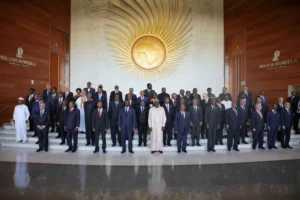
According to the African Union, Israel was not invited to the weekend summit because its observer status with the organization had been suspended.
The announcement follows the removal of Israeli ambassador Sharon Bar-li from the annual meeting of the African Union in Ethiopia on Saturday because she attempted to enter using an invitation that was meant solely for Aleli Admasu, Israel’s ambassador to the AU.
Guards could be seen escorting Bar-li out of the AU assembly hall in Addis Ababa, the capital of Ethiopia, in a video that was circulating on social media.
“The status is suspended until this committee has had a chance to consider its options… As a result, we did not invite Israeli officials to our summit, said Moussa Faki Mahamat, the head of the AU Commission, to reporters on Sunday. He also said that an investigation into the incident on Saturday was being carried out.
Israeli foreign ministry spokeswoman said that Bar-li was “an accredited observer with an admission tag” and claimed that a “small number of radical states, including Algeria and South Africa, which are driven by hatred and controlled by Iran,” were holding the AU hostage.
The episode brought to light a dispute inside the pan-African bloc over Mahamat’s 2021 unilateral decision to grant Israel observer status, which led to objections from some member nations.
After 20 years of diplomatic work, Israel was granted observer status. It had previously held the position at the Organisation of African Unity (OAU), but its attempts to reclaim it after the OAU’s dissolution and replacement by the AU in 2002 were repeatedly rejected.
The new position, according to the Israeli foreign ministry at the time, may allow Israel and the AU to collaborate more closely on a number of fronts, such as the battle against the coronavirus and the prevention “of the spread of extreme terrorism” on the African continent.
A discussion about whether to revoke the accreditation was put on hold at the AU summit last year, and a committee of heads of state was formed to handle the problem.
The South African government stated that it was “even more alarming in a year in which the oppressed people of Palestine were chased by devastating bombardments and ongoing illegal colonization of the land” that the African Union had decided to grant Israel the status.
With formal diplomatic ties having been established in 1995, the year after the end of apartheid, South Africa supports the Palestinian cause. In 2019, it converted its Tel Aviv embassy to a liaison office.




